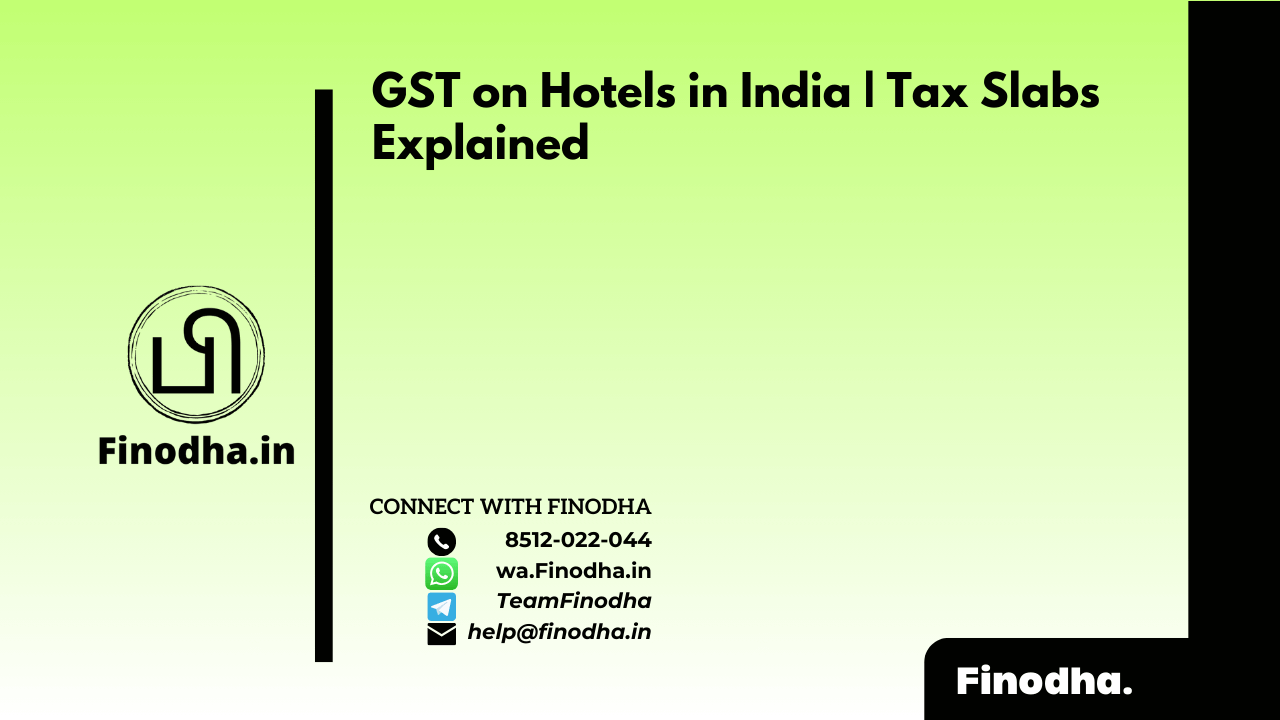Important Keywords: GST on Hotels in India, Tax Slabs Explained, GST On Hotel Tariff, GST on Hotel Room,
Words: 1,653; Read time: 9 minutes.
Table of Contents
A Complete Guide to GST on Hotels: Rates, Compliance, and Impact on Pricing
GST on hotels has become a significant aspect of the hospitality industry in India since its introduction in 2017. The Goods and Services Tax (GST) system replaced multiple indirect taxes, including VAT and luxury tax, creating a unified tax structure. This has made tax compliance easier for hotels but has also raised questions about how it affects room rates, services, and overall pricing. Whether you are a hotel owner, guest, or industry professional, understanding the GST on hotels is crucial to ensure proper compliance and avoid any legal issues. In this article, we will break down hotel GST rates, the tax on hotel stays, and how GST influences accommodation pricing.
Let’s explore how GST on hotels affects businesses and consumers, the benefits and challenges, and why it’s essential for every hotel to stay up-to-date with the latest regulations. Additionally, we will dive into how businesses can learn hotel GST compliance and simplify their processes through tools like Finodha.
What is GST and Why is it Relevant for Hotels?
GST, or Goods and Services Tax, is a single tax system that replaced several indirect taxes in India, including VAT, luxury tax, and service tax. By merging multiple taxes into one, GST has simplified the tax system for industries across the board, including the hospitality industry. GST on hotels is crucial as it governs the tax applicable on accommodation charges, restaurant services, and additional services provided by hotels.
The shift from various taxes to GST has streamlined the process for hotel businesses, allowing them to comply with a unified tax structure. Hotel GST rates are determined based on room tariffs, and the tax is collected by the government. Additionally, hotels can claim Input Tax Credit (ITC) for the tax paid on purchases, which can significantly reduce their tax burden.
GST also offers several benefits to the hospitality sector, including transparent pricing and simplified returns, which have positively impacted the overall tourism industry.
Hotel GST Rates: A Comprehensive Breakdown
Understanding GST on hotels involves knowing the various GST slabs applicable to hotel services. The government has set specific hotel GST rates based on room tariffs and additional services, ensuring a straightforward taxation process.
GST Slabs for Hotel Accommodations:
- No GST: If the room tariff is below ₹1,000 per night, it is exempt from GST.
- 12% GST: For rooms with tariffs between ₹1,000 and ₹7,500 per night, GST on hotels is set at 12%.
- 18% GST: For rooms exceeding ₹7,500 per night, the tax rate is increased to 18%.
GST on Other Hotel Services:
In addition to hotel GST rates on room tariffs, hotels also need to account for taxes on other services provided to guests:
- Restaurant Services: Food and beverage services offered by hotels are taxed at 5% to 18%, depending on the type of service.
- Banquet Halls and Outdoor Catering: For services like banquet halls and event spaces, 18% GST applies.
- Luxury Services: Premium services such as spas, high-end wellness facilities, and luxury vehicle rentals may be subject to an 18% or higher GST rate.
Each service is taxed according to its category, ensuring that the taxation of GST on hotels is clear and organized. Hotels should stay up-to-date with the latest changes in hotel GST rates to avoid compliance issues.
Tax on Hotel Stays: Key Benefits and Challenges
Benefits of GST on Hotel Stays:
- Simplified Tax Compliance: With GST on hotels, businesses no longer need to manage multiple tax registrations and filings. A single tax return simplifies the process.
- Input Tax Credit (ITC): Hotels can avail of ITC on the taxes paid on inputs like raw materials, utilities, and services. This reduces the overall tax burden on businesses.
- Boost to Tourism: Tax on hotel stays has made accommodations more affordable for customers. By reducing the final price, it helps in boosting tourism in India, making it more competitive globally.
Challenges:
- High GST Rates on Luxury Services: Luxury services such as spas and fine dining incur higher GST on hotels, making them less affordable for certain market segments.
- Complexity for Small Hotels: Smaller hotels may struggle with GST compliance due to the operational complexities involved, including filing returns and managing ITC.
Despite these challenges, the introduction of GST on hotels has streamlined tax filing and increased the transparency of pricing for hotel services, benefiting both businesses and guests.
GST for Accommodations: Impact on Pricing and Tourism
The introduction of GST for accommodations has had a direct impact on hotel pricing strategies. Room rates are now taxed according to the applicable hotel GST rates, and businesses need to adjust their pricing strategies accordingly. For example, a hotel room priced at ₹7,000 per night will attract a 12% GST (₹840), making the total cost ₹7,840 for customers.
Impact on Pricing:
- Room Tariffs: Hotels with room tariffs below ₹1,000 are not subject to GST. However, for rooms above this threshold, GST on hotels directly affects how businesses set their rates.
- Additional Services: Services such as restaurants, event spaces, and additional amenities are also impacted by hotel GST rates. This may result in higher costs for consumers, especially for premium services.
Effect on Tourism:
The introduction of GST for accommodations has made India’s tourism industry more competitive by offering a simplified pricing structure. However, tax on hotel stays may still pose challenges in terms of pricing for budget-conscious travelers. For international tourists, the increased tax burden could potentially reduce India’s competitiveness against other countries with lower tax rates.
Learn Hotel GST Compliance with Finodha
For hotel businesses to stay compliant with GST on hotels, it is crucial to follow the right procedures for registration, tax filing, and documentation. Finodha offers a simple and efficient way for hotels to stay on top of hotel GST rates and ensure timely compliance.
Step-by-Step Guide to GST Registration for Hotels:
- Choose Your Business Type: Hotels can register as individuals, LLPs, or private limited companies, with specific documents required for each business type.
- Submit Documents: Documentation typically includes PAN card, proof of address, and bank account details. Private companies may need additional documentation like board resolutions.
- Timeframes and Costs: GST registration can be completed within 3-7 days, and the registration fee is minimal.
Filing GST Returns Efficiently:
- GST Return Deadlines: Hotels must file GST returns on time to avoid penalties. Returns must be filed monthly, quarterly, or annually, depending on the turnover.
- Automation Tools: Finodha provides automated tools for filing GST returns and calculating ITC, making the process seamless and efficient.
By partnering with Finodha, hotel owners can simplify GST on hotels compliance, reduce errors, and focus on growing their business.
How Technology Can Simplify Hotel GST Management
Technology plays a vital role in simplifying the management of GST on hotels. A robust, GST-compliant hotel management system can make tax calculations, documentation, and returns much easier.
Key features of a GST-compliant system include:
- Automated Tax Calculation: Ensures the correct application of hotel GST rates on bookings and services.
- ITC Management: Tracks taxes paid on purchases, helping hotels claim input credits and reduce their overall tax liabilities.
- Seamless Filing: GST-compliant systems make it easier to file returns on time, reducing the risk of penalties and mistakes.
By adopting modern technology, hotels can significantly ease the burden of hotel GST rates and ensure timely compliance.
Conclusion
GST on hotels has reshaped the hospitality industry, making tax compliance more straightforward but also bringing new challenges. By understanding hotel GST rates and how they impact pricing, hotels can make informed decisions about room rates and services. Moreover, businesses can simplify their tax management through platforms like Finodha, ensuring compliance with GST for accommodations without hassle.
Whether you’re managing a small guesthouse or a large hotel chain, understanding tax on hotel stays is crucial. Keep up with hotel GST rates to ensure smooth operations and a competitive edge in India’s ever-evolving hospitality sector.
Simplify GST with Finodha
Ready to make GST compliance hassle-free? Partner with Finodha, India’s most affordable GST and business support platform. Register your business or file your returns in just a few clicks. Call us now at +91-8512-022-044 or visit Finodha.in to get started today!
Frequently Asked Questions (FAQs)
Q1. What is the GST rate for hotels?
GST rates for hotels depend on room tariffs. Rooms below ₹1,000 are exempt from GST, while tariffs between ₹1,000 and ₹7,500 attract 12% GST, and rooms above ₹7,500 are taxed at 18%.
Q2. Are GST rates different for luxury hotels?
Yes, luxury hotels often have higher GST on hotels due to their premium pricing. Services such as spas and fine dining are taxed at 18% GST.
Q3. How does GST affect hotel pricing?
GST on hotels directly impacts room tariffs and services. For example, a room priced at ₹7,000 per night will incur a 12% GST, increasing the total cost for guests.
Q4. Can small hotels benefit from GST?
Yes, small hotels can benefit from Input Tax Credit (ITC) on taxes paid on business-related expenses, which can reduce their overall tax burden.
Q5. What is Input Tax Credit (ITC)?
ITC allows hotels to claim tax credits on the taxes paid on purchases, such as raw materials and services, which can offset the GST on hotels they collect from guests.
Q6. Is GST applicable on food and beverage services in hotels?
Yes, GST on hotels also applies to food and beverage services. The tax rate can vary from 5% to 18%, depending on the nature of the service.
Q7. What is the registration process for GST in hotels?
Hotels need to complete GST registration by submitting documents like PAN cards, proof of address, and bank details. The process usually takes 3-7 days.
Q8. How can hotels ensure timely GST compliance?
Hotels can ensure compliance by using automated tools like Finodha for tax calculations, documentation, and timely filing of returns.
More Information: https://taxinformation.cbic.gov.in/
Read more interesting articles:


